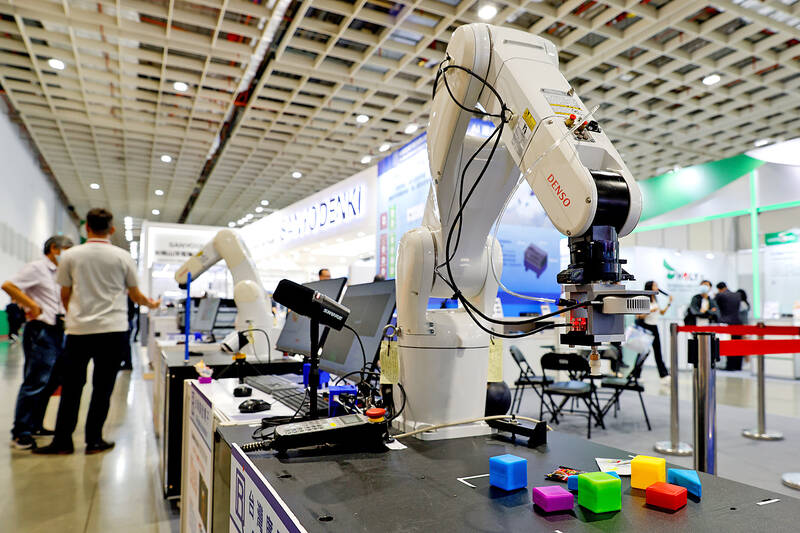The industrial production index rose 15.48 percent year-on-year to 115.38 last month, driven by steady growth in information technology and electronics production fueled by demand for artificial intelligence (AI) and high-performance computing products, the Ministry of Economic Affairs said yesterday.
The manufacturing production index, which comprises 94.63 percent of the industrial production index, last month increased 16.9 percent from September last year to 116.51, the ministry said.
The rise in the manufacturing production index was the 19th consecutive month of growth and in line with the ministry’s forecast of 114.58 to 118.58, Department of Statistics Deputy Director-General Chen Yu-fang (陳玉芳) told a news conference in Taipei.

Photo: EPA
That lifted the third-quarter industrial and manufacturing production indices by 15.9 percent and 17.24 percent year-on-year respectively, the ministry said.
In the first nine months of this year, the industrial and manufacturing production indices rose 16.37 percent and 17.57 percent respectively from the same period last year, it said.
The manufacturing production index this month is expected to rise 13.6 to 17.6 percent year-on-year, supported by continued demand for advanced semiconductors and servers, Chen said.
While global trade protectionism and geopolitical uncertainties remain key risks, strong demand for emerging-technology applications and front-loading ahead of the year-end peak season are expected to boost the figure this quarter, she said, adding that the full-year manufacturing production index could hit a record.
The report showed that production of electronic components last month rose 24.39 percent, supported by new smartphone launches in the US, South Korea and China, while semiconductor output grew 26.53 percent as consumer electronics orders drove chip production and design, Chen said.
Production of computers, electronic goods and optical components last month grew 26.28 percent from September last year, while output of flat panels and related components rose 14.11 percent from a year earlier, ending two months of declines, she said.
Whether panel output would rebound this quarter depends on demand during China’s National Day holiday, and the year-end peak season in the US and European markets, she added.
The data also showed persistent weakness in traditional industries amid pressure from US tariffs and oversupply from China, the ministry said.
Base metal production, mainly steel, last month fell 2.63 percent from a year earlier, as the sector continued to face price competition from China, while the output of chemical materials and fertilizers rose 0.44 percent, ending six months of declines, driven by growing demand from semiconductor clients for polished wafers, Chen said.
Vehicle output last month fell 7.82 percent from the same month last year as demand for auto components, particularly in the US and European markets, remained weak, but machinery equipment production grew 10.71 percent as plant expansions by chipmakers boosted demand for related equipment, she said, adding that machine tool output also rebounded slightly.

NEW IDENTITY: Known for its software, India has expanded into hardware, with its semiconductor industry growing from US$38bn in 2023 to US$45bn to US$50bn India on Saturday inaugurated its first semiconductor assembly and test facility, a milestone in the government’s push to reduce dependence on foreign chipmakers and stake a claim in a sector dominated by China. Indian Prime Minister Narendra Modi opened US firm Micron Technology Inc’s semiconductor assembly, test and packaging unit in his home state of Gujarat, hailing the “dawn of a new era” for India’s technology ambitions. “When young Indians look back in the future, they will see this decade as the turning point in our tech future,” Modi told the event, which was broadcast on his YouTube channel. The plant would convert

‘SEISMIC SHIFT’: The researcher forecast there would be about 1.1 billion mobile shipments this year, down from 1.26 billion the prior year and erasing years of gains The global smartphone market is expected to contract 12.9 percent this year due to the unprecedented memorychip shortage, marking “a crisis like no other,” researcher International Data Corp (IDC) said. The new forecast, a dramatic revision down from earlier estimates, gives the latest accounting of the ongoing memory crunch that is affecting every corner of the electronics industry. The demand for advanced memory to power artificial intelligence (AI) tasks has drained global supply until well into next year and jeopardizes the business model of many smartphone makers. IDC forecast about 1.1 billion mobile shipments this year, down from 1.26 billion the prior

People stand in a Pokemon store in Tokyo on Thursday. One of the world highest-grossing franchises is celebrated its 30th anniversary yesterday.

Zimbabwe’s ban on raw lithium exports is forcing Chinese miners to rethink their strategy, speeding up plans to process the metal locally instead of shipping it to China’s vast rechargeable battery industry. The country is Africa’s largest lithium producer and has one of the world’s largest reserves, according to the US Geological Survey (USGS). Zimbabwe already banned the export of lithium ore in 2022 and last year announced it would halt exports of lithium concentrates from January next year. However, on Wednesday it imposed the ban with immediate effect, leaving unclear what the lithium mining sector would do in the